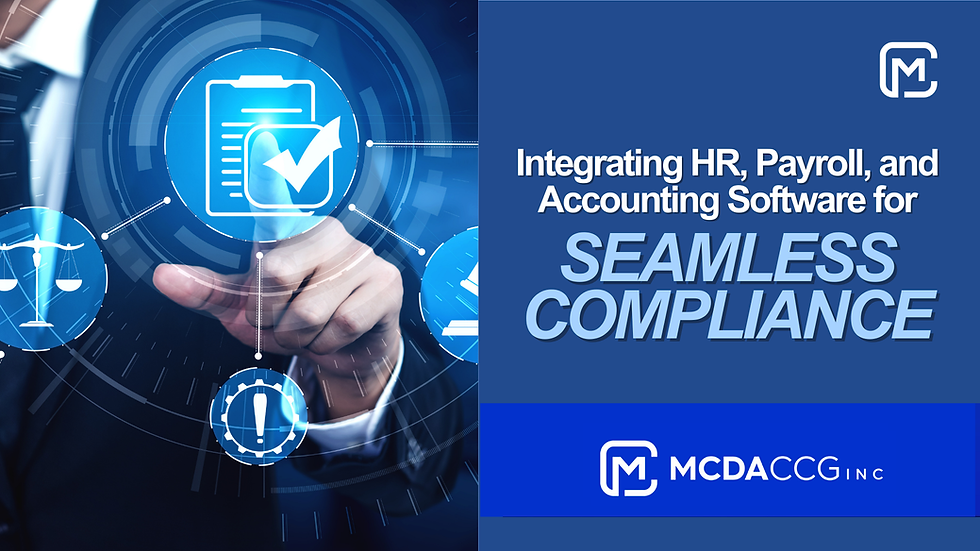Why Your Financial Data Is Only as Smart as the Questions You Ask It
- MCDA CCG, Inc.

- Jul 24, 2025
- 3 min read
In today’s data-rich business environment, it’s tempting to assume that having access to financial data is enough. After all, with dashboards, automated reports, and real-time metrics at our fingertips, we should be swimming in insight — right?
Not necessarily.
The hard truth is: your financial data is only as valuable as the questions you know to ask of it. In other words, more data doesn’t automatically mean better decisions. It just means more noise — unless you’re actively shaping the signal.
The Illusion of Insight
Modern finance teams have invested heavily in data infrastructure — ERP systems, BI tools, cloud accounting platforms, and real-time dashboards. While these tools can surface key metrics (cash flow, margins, run rate, etc.), they don't inherently tell you what matters, why it’s happening, or what to do next.
That insight only comes when someone — usually a human — asks the right question.
For example:
“Why is gross margin down despite higher revenue?”
“What’s driving our customer acquisition cost in Q3?”
“What would happen to our runway if we delayed hiring by 90 days?”
These aren’t questions a dashboard will volunteer. They require financial curiosity, business context, and the confidence to dig deeper.
The Role of the Modern Finance Leader
This is where the modern CFO and finance team stand apart — not just as stewards of data, but as translators between the numbers and the business decisions they inform.
Data literacy matters, but so does decision literacy: the ability to frame questions that matter strategically, not just technically.
Asking better questions can help finance teams:
Spot early warning signs before they become problems
Pressure-test assumptions in forecasts and models
Connect financial outcomes to operational behaviors
Lead more informed conversations with cross-functional teams
AI Won’t Solve This for You
Even as AI and machine learning become more embedded in finance platforms, the core issue remains: if your inputs are vague or misaligned, your outputs will be too.
Tools like ChatGPT, predictive analytics, or anomaly detection can surface patterns and simulate scenarios — but they can’t decide what question your business should be asking.
That responsibility still falls on the human side of the equation.
In fact, AI may even widen the gap between teams that ask good questions and those that don’t. The more powerful the tool, the more important it becomes to know how to use it well.
How to Ask Smarter Questions
Asking smarter questions isn’t about having a background in statistics or coding. It’s about adopting a mindset of curiosity, context, and critical thinking. Here are a few practical approaches:
1. Start With the Business, Not the NumbersInstead of diving into spreadsheets, begin with the business objective: What decision are we trying to make? What risk are we trying to mitigate? Then look to data to inform the answer.
2. Challenge AssumptionsEvery financial report rests on a set of assumptions. Question them. What are we assuming about demand, seasonality, churn, or pricing power? How sensitive are our outcomes to changes in those assumptions?
3. Look for Relationships, Not Just ResultsDon't just ask what happened. Ask why it happened and how it connects to other metrics. For example, a spike in expenses might be tied to delayed revenue, hiring ahead of growth, or one-time vendor costs.
4. Invite Diverse PerspectivesFinance doesn’t operate in a vacuum. Loop in ops, marketing, sales, or product leaders to understand the “why” behind the “what.” Collaborative questioning often leads to richer insight.
5. Revisit and RefineSmart questions aren’t always asked once. Revisit them regularly as the business context evolves. A question that seemed minor last quarter might be pivotal this one.
Final Thoughts
Access to financial data isn’t the competitive edge it once was — it’s the baseline. The real differentiator is how teams use that data to explore the business more thoughtfully and make sharper decisions.
In the end, your financial data doesn’t think for you. But if you know how to ask it the right questions, it will speak volumes.



Comments